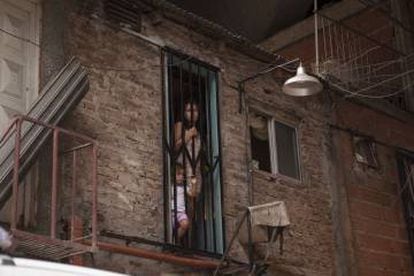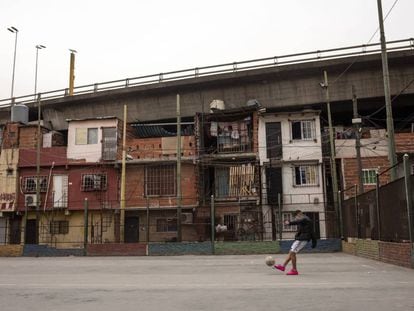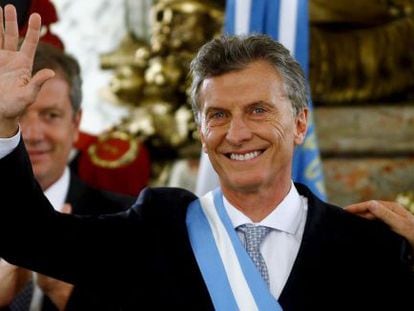A year after Macri’s upset victory, Argentina is deeper in crisis than ever
Yet president still enjoys popularity thanks to belief economy will turn around in 2017

When Mauricio Macri won the elections in Argentina a year ago, there was a wave of enthusiasm. His accentuate-the-positive campaign had promised “a revolution of joy,” which, combined with a strategy that made good use of the social media, allowed a political outsider to defeat the all-powerful forces of Peronism, if only by a three-point margin.

A year later, however, the enthusiasm has waned. Argentina remains mired in a recession that is only getting deeper, with inflation running rampant at an annual rate of 40% and GDP retreating by 3.4%.
“Today is a historic day: it signals a change into a new era that, as I told you and you believed, is going to be wonderful,” proclaimed Macri on the night of November 22, 2015. “This change will have to lead us toward the future, toward the opportunities that we need to grow, to make progress.”
The newly elected president further promised that this change would not result in a political settling of scores, but that it would bring all Argentineans together.
After 13 years of Kirchner rule, Argentineans have decided to give their president some leeway
“This change needs to channel all its energy and vitality into building the kind of Argentina that we all dream of. We have said that we have to build an Argentina with zero poverty, and we’re going to do it together.”
For the first time, a presidential election had been won not by a Peronist or by a radical candidate, but by a former businessman and billionaire who had created from scratch his own party, the PRO, with help from his top aides Marcos Peña and Jaime Durán Barba. Only two years earlier, support for the PRO had been under 15%. “It was a miracle,” the latter told EL PAÍS soon after Macri’s victory.
The new president’s popularity ratings soared to nearly 70%. He lifted currency controls, and nothing happened. He settled with the so-called “vulture” funds to the tune of €9.3 billion, and nothing happened. He began making deals with governors and labor unions, and everyone applauded him as he got his initiatives approved in Congress without trouble.
But even Macri was no match for the eternal enemy of every president of Argentina: inflation.

Prices have soared to such levels that Argentina is now the most expensive country of Latin America’s major nations. And the difference rises with each passing month, because prices keep going up at a much faster rate than in Chile, Brazil, Peru, Colombia or Mexico, while the peso barely loses any value.
The recession had already begun toward the end of Cristina Fernández de Kirchner’s mandate, and it is now getting worse, among other things because industry is no longer competitive at these prices, while inflation is also strangling consumption.
As a result, collective patience is wearing thin in a nation whose people are not particularly known for their patience in the first place.
So far, the biggest beneficiaries are the financial experts who invest in lending, now an extraordinary business with interest rates of 27%. Agriculture is doing better too, thanks to significant tax cuts that have made soy, corn and other staple crops profitable once more.
Prices have soared to such levels that Argentina is the most expensive of Latin America’s major nations
Mining, which is largely in the hands of multinationals, also got some tax breaks and experienced growth. But industry, commerce and the bulk of the residents of Greater Buenos Aires are increasingly feeling the pain.
All experts agree that Macri won the election chiefly because people wanted a change after 13 years of the Kirchners. And the government likes to point out that it inherited a bad economic situation.
This, coupled with the enormous division within the Peronist opposition, which is currently fighting over who gets to be the leader, is allowing Macri to hold on to his lead in the polls.
But his popularity has dropped to 51%, according to the latest poll by the Public Opinion Group (GOP). This is still one of the highest ratings of any Latin American leader, and even more impressive if the country’s economic situation is considered, as well as the tough measures introduced since Macri took office, including 500% hikes on gas and electricity bills.
The real problem lies in the downward trend and the narrowing margin of trust.
Polls show there is still a widespread belief in Argentina that the economy will turn around in 2017. And that is when the stakes will really be high, because 2017 is an election year. By then, Macri will need to show some results. First he promised there would be visible improvement in the second half of 2016. Then he said it would be in the last quarter of the year. Now he is talking about 2017.
After 13 years of Kirchner rule, Argentineans have decided to give their president some leeway. But a day will soon come when they will ask him to fulfill the promise that he made on election night: “I am here thanks to all Argentineans, to help them live a little better and be happier each day.”
English version by Susana Urra.












































